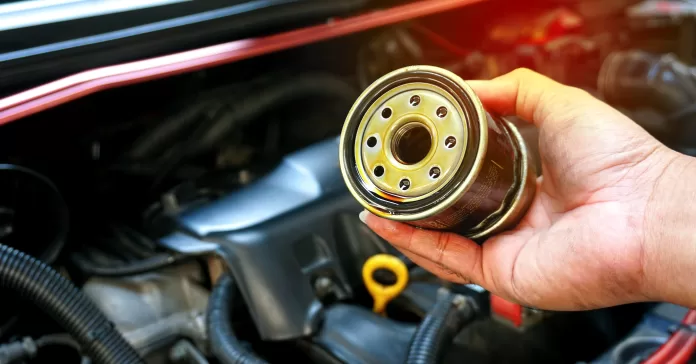Imagine your engine’s worst nightmare; a faulty oil filter. Without engine oil filter, your engine would be a hot mess! Engine oil filters ensure only the cleanest oil flows through your car’s veins – the engine. Trapping particles as small as 25 microns, oil filters prevent sludge buildup, contaminants and debris that can cause damage over time, maintaining an optimal oil flow throughout your engine.
Significance of Maintaining a Healthy Oil Filter
Regularly changing your oil filter is essential for maintaining the health and longevity of your engine. A clogged or dirty oil filter can restrict oil flow, leading to increased wear and tear on engine components. Ensure your oil filter is clean and functioning properly, and you can prevent costly repairs and keep your car running smoothly.
Role of Engine Oil Filters in Vehicle Performance
Oil filters aren’t just about keeping the oil clean; they also maintain optimal engine performance. A clean filter means your engine can breathe easy and perform at its best. When your engine oil filter becomes clogged, it can lead to a variety of issues that can impact your vehicle’s performance, such as reduced fuel efficiency, engine misfires, and even engine stalling are all common symptoms of a clogged oil filter. Ignoring these signs can lead to costly repairs and potential engine damage.
Impact of Clean Oil Filters on Engine Longevity
Regularly changing your oil filter might seem like a chore, but it’s worth it. A clean filter can help extend the lifespan of your engine, saving you from premature breakdowns and wallet-induced heartaches.
Symptoms of a Clogged Engine Oil Filter
Decrease in fuel efficiency
One of the most common symptoms of a clogged engine oil filter is a decrease in fuel efficiency. If you notice that you’re filling up your gas tank more frequently than usual, it could be a sign that your filter is not allowing oil to flow smoothly through the engine. You may also experience difficulty starting your engine, as a clogged filter can prevent proper lubrication and cause strain on the engine components.
Reduced Oil Pressure and Engine Noise
When your oil filter is clogged, your engine might start throwing a tantrum in the form of low oil pressure warnings. Not receiving proper lubrication due to a clogged filter, it can lead to increased friction and heat within the engine components.
From unsettling rattles to sluggish acceleration, a clogged oil filter can wreak havoc on your engine’s performance. It’s important to address this issues promptly to ensure the longevity and health of your vehicle.
Reduced Vehicle Performance
A contaminated oil filter can turn your engine’s oil supply into a toxic brew, leading to increased wear and tear on vital components. From damaged pistons to a worn-out engine, a faulty oil filter can be the culprit behind a myriad of engine nightmares.
Diagnosis and Inspection of Engine Oil Filter Issues
Identifying Filter Blockages
When your car’s engine oil filter is clogged or faulty, you may notice symptoms like reduced engine performance, increased engine noise, or even warning lights on your dashboard. To identify potential blockages, pay attention to these signs and consider performing a quick inspection.
Visual Inspection for Oil Filter Health
Performing regular visual checks on your engine oil filter can help you catch potential issues early. Look for visible signs of damage, such as leaks, dents, or excessive dirt buildup. Inspect the filter during oil changes to ensure it is in good condition.
Engine Oil Filter Maintenance and Replacement
Make it a habit to check your engine oil filter during routine maintenance checks or oil changes. Follow the manufacturer’s recommendations for filter replacement intervals based on your driving habits and conditions.
Regular maintenance can help prevent costly repairs down the line.
When it’s time to replace your engine oil filter, make sure to use a high-quality, compatible filter. Follow the manufacturer’s instructions for installation and replacement to ensure proper fit and function. Be sure to dispose of the old filter responsibly according to local regulations.
Neglecting engine oil filter maintenance can lead to serious consequences of clogs and restrict oil flow, resulting in decreased engine performance and potential overheating issues which can potentially cause safety hazards on the road. Take the time to regularly check and replace your oil filter, to prevent these issues and keep your engine running smoothly for years to come.
Maintaining a clean and functioning engine oil filter is a fundamental aspect of preserving the health and performance of your car’s engine. Recognizing the signs of a clogged or faulty oil filter and addressing them promptly through regular maintenance and filter replacements, you can prevent major engine damage and costly repairs.
The engine oil filter may be small in size, but its impact on engine longevity is significant. Prioritizing the health of your engine oil filter will ultimately lead to a smoother and more efficient driving experience for years to come.




